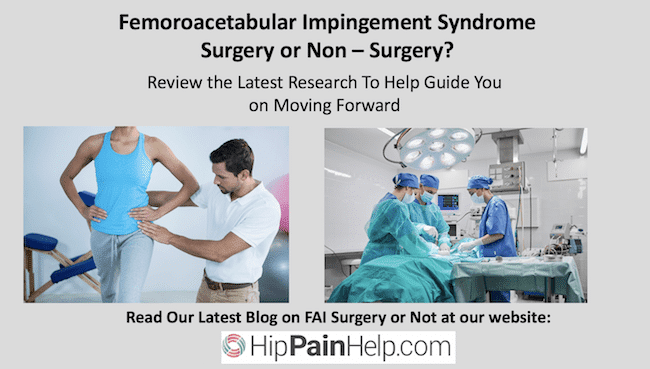FAIS Surgery Versus Conservative Management of FAIS
In recent years there has been a plethora of high quality research trials looking at FAIS surgery versus conservative management of FAIS.
To read more about what this condition is and its causes click here to read our earlier blog
To learn more about if you have Femeroacetabular Impingement Syndrome click here to read our previous blog.

The first important point here is that no treatment is required for asymptomatic FAI – if you have a FAI bony shape but no pain, then there is no need to seek active treatment. There was a period where surgeons were offering preventative surgery to ‘correct’ bony variations but there is absolutely no evidence for this approach and problems may be created in hips that may never have become painful. The world’s leading surgeons and other health professionals in this field all agree that PREVENTATIVE SURGERY is NOT RECOMMENDED¹.

In patients who are treated for FAI syndrome, symptoms frequently improve, and they return to full activity, including sports. Without treatment, symptoms of FAI syndrome will probably worsen over time. The long-term outlook for patients with FAI syndrome is unknown. However, it is likely that cam morphology is associated with hip osteoarthritis, degeneration of the joint cartilage over time. It is currently unknown whether treatment for FAI syndrome prevents hip osteoarthritis.
What is The Evidence for FAIS Surgery versus Non- Surgery
Scientific evidence for management of FAIS has only recently started to emerge, with the first high-quality surgical studies (randomised clinical trials) published in 2018² ³. Early pilot trials assessing outcomes of high-quality physiotherapy programs have also been published.
The evidence so far suggests:
- Both surgery and physiotherapist-led rehabilitation provide significant reductions in pain and improvements in function
- Surgery may provide outcomes that are mildly better than rehabilitation alone, if you only have access to limited, publicly funded care. The affect of more frequent physiotherapy intervention, compared to these currently more limited intervention trials, as yet has not been researched.
- Surgery comes with increased health risks, although complications are uncommon
- Neither intervention at this point restores full painfree function – 1-2 years later participants of these trials still report ongoing problems and have often not returned to full sporting participation 4.
- Surgery is not a ‘fix’ and optimal outcomes will require substantial commitment to high-quality rehabilitation that targets individual deficits in hip and trunk muscles strength, balance and functional ability 5.
So Is It Worth Trialling Non-Surgery First?
Considering the available evidence, a trial of non-surgical care for 3-6 months, with excellent adherence to the specific advice and prescribed exercise program is recommended before considering a surgical intervention. In some circumstances, earlier progression to surgery may be recommended but there are currently no clear guidelines as to who should consider an early surgical option.

How Can You Find a Hip Pain Professional That can Help?
Always seek out a health professional with extensive experience and up-to-date knowledge in this area. Visit our directory to find a Hip Pain Professional near you.

References
- Griffin, D., Dickenson, E., O’Donnell, J et al. (2016). The Warwick Agreement on femoroacetabular impingement syndrome (FAI syndrome): an international consensus statement. British Journal of Sports Medicine, 50(19), pp.1169-1176.
- Griffin, D., Dickensen, E., Hobson, R., et al. (2018). Hip arthroscopy compared to best conservative care for the treatment of femoroacetabular impingement syndrome: a randomised controlled trial (UK FASHIoN). Osteoarthritis and Cartilage, 26, pp.S24-S25.
- Mansell, NS., Rhon, DI., Meyer, J., Slevin, JM., Marchant, BG. (2018). Arthroscopic surgery or physical therapy for patients with femoroacetabular impingement syndrome: A randomized controlled trial with 2-year follow-up. American Journal of Sports Medicine, 46(6), pp.1306-1314.
- Thorborg, K., Kraemer, O., Madsen, AD., Holmich, P. (2018). Patient-reported outcomes within the first year after hip arthroscopy and rehabilitation for femoroacetabular impingement and/or labral injury: The difference between getting better and getting back to normal. American Journal of Sports Medicine, 46(11), pp.2607-2614
- Freke, MD., Kemp, J., Svege, I., Risberg, MA., Semciw, A., Crossley, KM. (2016). Physical impairments in symptomatic femoroacetabular impingement: a systematic review of the evidence. British Journal of Sports Medicine 2016, 50(19), pp.1180.







